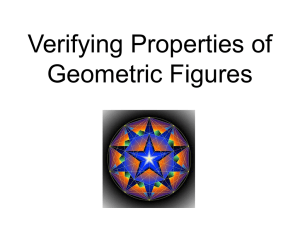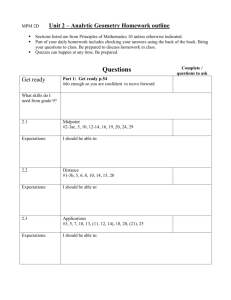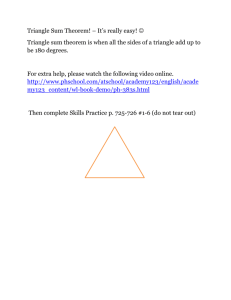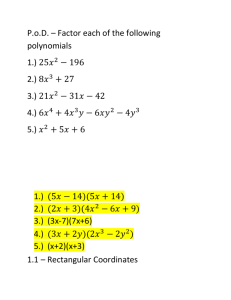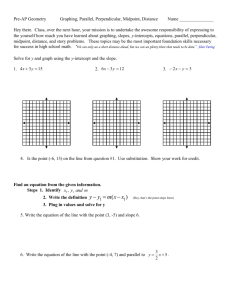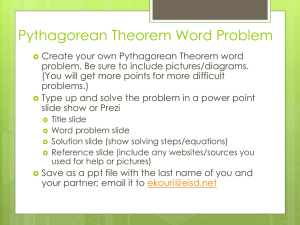Unit objectives and associated learning goals
advertisement
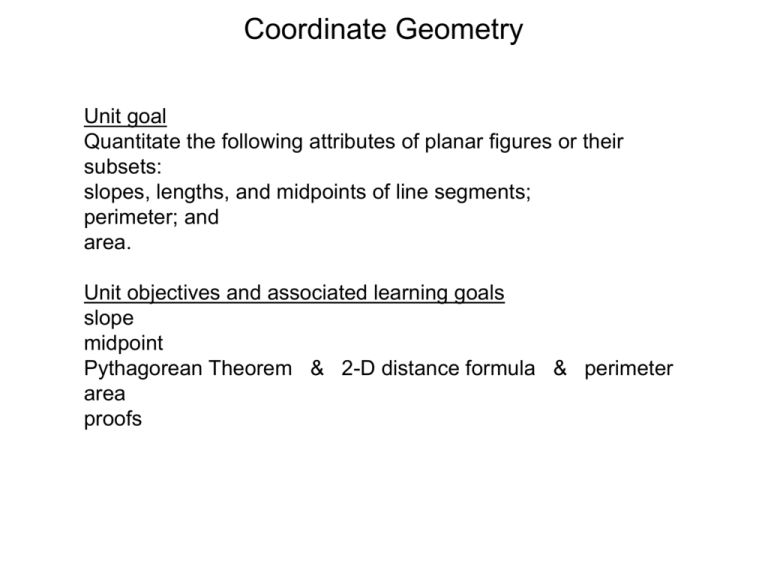
Coordinate Geometry Unit goal Quantitate the following attributes of planar figures or their subsets: slopes, lengths, and midpoints of line segments; perimeter; and area. Unit objectives and associated learning goals slope midpoint Pythagorean Theorem & 2-D distance formula & perimeter area proofs • Slope • 1. • 2. • 3. • 4. • 5. • 6. Comprehension and Communication: students will explain the definition or reasoning behind parallel lines Discover a relationship: students will graph two parallel, linear equations and discover that the x-coefficients are the same Simple knowledge: students will recognize rise/run Creative Thinking: Students will develop a way to calculate slope using Coordinate Geometry Algorithmic skills: Students will use the Slope Formula to calculate slope, when given two points. Construct a concept: Zero, undefined, parallel, perpendicular, positive and negative, oblique • Midpoint • 1. Creative Thinking: Students will develop a formula for the midpoint of a line segment, when given the coordinates of the end points. • 2. Simple knowledge: Students will memorize the midpoint formula. • 3. Algorithmic: Students will use the midpoint formula to calculate the midpoint, when given the coordinates of the endpoints. • Pythagorean Theorem, Distance Formula, Perimeter • 1. Discover a Relationship: Students will use a right triangle and squares to discover the relationship between the sides and hypotenuse of a right triangle. • 2. Application: Students will use real life problems to test and check the Pythagorean Theorem. • 3. Algorithmic Skills: Students will use the Pythagorean Theorem to find the side or hypotenuse of right triangles. • 4. Critical Thinking: Students will use triangles that have sides parallel to the axes to calculate the lengths of each side and develop a formula to use as a general rule. • 5. Critical Thinking: Students will use a rotated, right triangle to discover the distance formula. • 6. Application: Students will use the distance formula to compute perimeter problems • Area • 1. Appreciation: Students will appreciate that area allows them to calculate how much 2-D space is available. • 2. Simple Knowledge: Students will state the formula for finding the area of a triangle and rectangle. • 3. Algorithmic Skill: Students will use the Distance formula to find the quantities necessary for use in area formulae. • Proofs • 1. Comprehension and Communication: Students will show that two sequential sides, in a rectangle or right triangle, are perpendicular. • 2. Application: Students will find the equation of a line that is parallel or perpendicular to a given line that passes through a given point. 1. What does it mean that two lines are parallel? 2. Graph: y = 3x + 1, y = 3x - 3, y = x + 3 What part(s) of the equations makes these lines parallel? 3. What mnemonic do you know that helps you calculate the slope (i.e., m) in y = mx + b? rise m run 4. Sketch this figure: (1, 2), (1, 5), (6, 5) Describe and calculate the slopes of each segment, y y m 2 1 if you can. x2 x1 5. http://www.kutasoftware.com/FreeWorksheets/Alg1Worksheets/Slop e%20From%20a%20Graph.pdf http://www.kutasoftware.com/FreeWorksheets/Alg1Worksheets/Slop e%20From%20Two%20Points.pdf http://www.kutasoftware.com/FreeWorksheets/Alg1Worksheets/Slop e%20From%20an%20Equation.pdf 6. Label the 5 colored lines as having zero, undefined, parallel, perpendicular, positive, or negative slopes. Slope Midpoint 1. Plot these two points: (2, 3), (8, 3). Construct a line segment. Where is the midpoint or halfway point along the segment? Propose a formula for calculating the x-coordinate of the midpoint. Propose a formula for calculating the y-coordinate of the midpoint. 2. Convince your teacher that you have this memorized: x1 x2 the average x-value 2 y y ym 1 2 the average y-value 2 xm 3. http://www.kutasoftware.com/FreeWorksheets/Alg1Worksheets/Midpoint%20Formula.pd f Pythagorean Theorem, Distance, and Perimeter 1. Using puzzle pieces, discover the area interpretation of the Pythagorean Theorem. Relate it to the algebraic expression: a2 + b2 = c2 2. Drop stakes in the ground at the locations of the vertices of a quadrilateral of 4 known sides. Use the Pythagorean Theorem to see if your quadrilateral is a rectangle. 3. http://www.kutasoftware.com/FreeWorksheets/GeoWorksheets/8The%20Pythagorean%20Theorem%20and%20Its%20Converse.pdf http://www.kutasoftware.com/FreeWorksheets/GeoWorksheets/8-MultiStep%20Pythagorean%20Theorem%20Problems.pdf A third worksheet where the coordinates of the triangles are given. 4. How can we calculate the lengths of the shorter sides of the red triangle? Develop these formulae: h y2 y1 b x2 x1 5. Calculate the length of all three segments of the blue triangle. Develop the distance formula: d x2 x1 2 y2 y1 2 6. Use Geogebra or Geometer’s Sketchpad to design a polygonal but nonrectangular swimming pool or skate park. Use the software to calculate the perimeter, but calculate the lengths of at least two of the sides by hand. Area 1. What quantity would allow you to paint the swimming pool or skate park you designed? How many squares can you put inside a rectangle? What size of squares can you use? 2. Determine if those at your table know the formulas for the area of a rectangle and triangle. Arectangle b h Atriangle bh 2 3. Calculate the area of the red triangle using the coordinates of the vertices. The right triangle shown below has an area of 25. Find its hypotenuse. Proofs 1. Students will explain, in their own words why a given figure is a rectangle or a right triangle (students may say “90° angle,” but must demonstrate “perpendicular line segments,” and “opposite sides are congruent” (for rectangles). 2. Students will, when given a line and a point not on the line, find a line that is perpendicular or parallel, to the given line.
